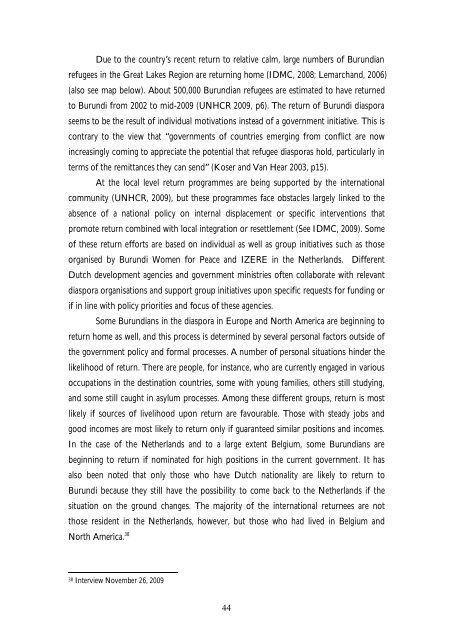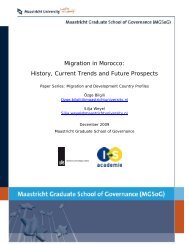Migration in Burundi: History, Current Trends and Future - MGSoG ...
Migration in Burundi: History, Current Trends and Future - MGSoG ...
Migration in Burundi: History, Current Trends and Future - MGSoG ...
You also want an ePaper? Increase the reach of your titles
YUMPU automatically turns print PDFs into web optimized ePapers that Google loves.
Due to the country’s recent return to relative calm, large numbers of <strong>Burundi</strong>an<br />
refugees <strong>in</strong> the Great Lakes Region are return<strong>in</strong>g home (IDMC, 2008; Lemarch<strong>and</strong>, 2006)<br />
(also see map below). About 500,000 <strong>Burundi</strong>an refugees are estimated to have returned<br />
to <strong>Burundi</strong> from 2002 to mid-2009 (UNHCR 2009, p6). The return of <strong>Burundi</strong> diaspora<br />
seems to be the result of <strong>in</strong>dividual motivations <strong>in</strong>stead of a government <strong>in</strong>itiative. This is<br />
contrary to the view that “governments of countries emerg<strong>in</strong>g from conflict are now<br />
<strong>in</strong>creas<strong>in</strong>gly com<strong>in</strong>g to appreciate the potential that refugee diasporas hold, particularly <strong>in</strong><br />
terms of the remittances they can send” (Koser <strong>and</strong> Van Hear 2003, p15).<br />
At the local level return programmes are be<strong>in</strong>g supported by the <strong>in</strong>ternational<br />
community (UNHCR, 2009), but these programmes face obstacles largely l<strong>in</strong>ked to the<br />
absence of a national policy on <strong>in</strong>ternal displacement or specific <strong>in</strong>terventions that<br />
promote return comb<strong>in</strong>ed with local <strong>in</strong>tegration or resettlement (See IDMC, 2009). Some<br />
of these return efforts are based on <strong>in</strong>dividual as well as group <strong>in</strong>itiatives such as those<br />
organised by <strong>Burundi</strong> Women for Peace <strong>and</strong> IZERE <strong>in</strong> the Netherl<strong>and</strong>s. Different<br />
Dutch development agencies <strong>and</strong> government m<strong>in</strong>istries often collaborate with relevant<br />
diaspora organisations <strong>and</strong> support group <strong>in</strong>itiatives upon specific requests for fund<strong>in</strong>g or<br />
if <strong>in</strong> l<strong>in</strong>e with policy priorities <strong>and</strong> focus of these agencies.<br />
Some <strong>Burundi</strong>ans <strong>in</strong> the diaspora <strong>in</strong> Europe <strong>and</strong> North America are beg<strong>in</strong>n<strong>in</strong>g to<br />
return home as well, <strong>and</strong> this process is determ<strong>in</strong>ed by several personal factors outside of<br />
the government policy <strong>and</strong> formal processes. A number of personal situations h<strong>in</strong>der the<br />
likelihood of return. There are people, for <strong>in</strong>stance, who are currently engaged <strong>in</strong> various<br />
occupations <strong>in</strong> the dest<strong>in</strong>ation countries, some with young families, others still study<strong>in</strong>g,<br />
<strong>and</strong> some still caught <strong>in</strong> asylum processes. Among these different groups, return is most<br />
likely if sources of livelihood upon return are favourable. Those with steady jobs <strong>and</strong><br />
good <strong>in</strong>comes are most likely to return only if guaranteed similar positions <strong>and</strong> <strong>in</strong>comes.<br />
In the case of the Netherl<strong>and</strong>s <strong>and</strong> to a large extent Belgium, some <strong>Burundi</strong>ans are<br />
beg<strong>in</strong>n<strong>in</strong>g to return if nom<strong>in</strong>ated for high positions <strong>in</strong> the current government. It has<br />
also been noted that only those who have Dutch nationality are likely to return to<br />
<strong>Burundi</strong> because they still have the possibility to come back to the Netherl<strong>and</strong>s if the<br />
situation on the ground changes. The majority of the <strong>in</strong>ternational returnees are not<br />
those resident <strong>in</strong> the Netherl<strong>and</strong>s, however, but those who had lived <strong>in</strong> Belgium <strong>and</strong><br />
North America. 38<br />
38 Interview November 26, 2009<br />
44



